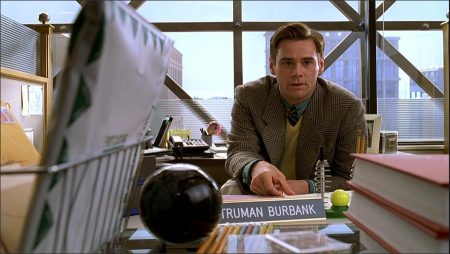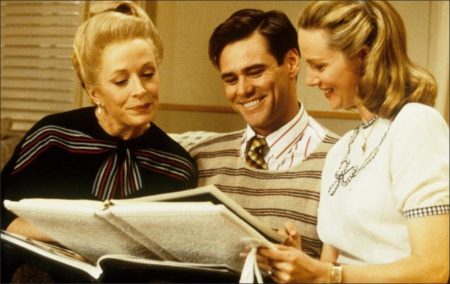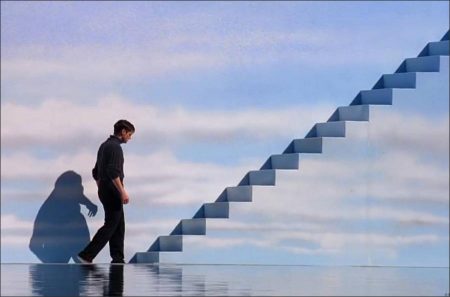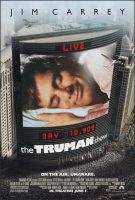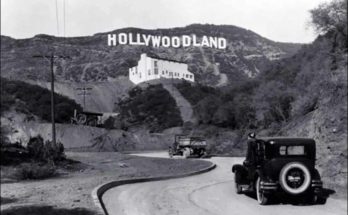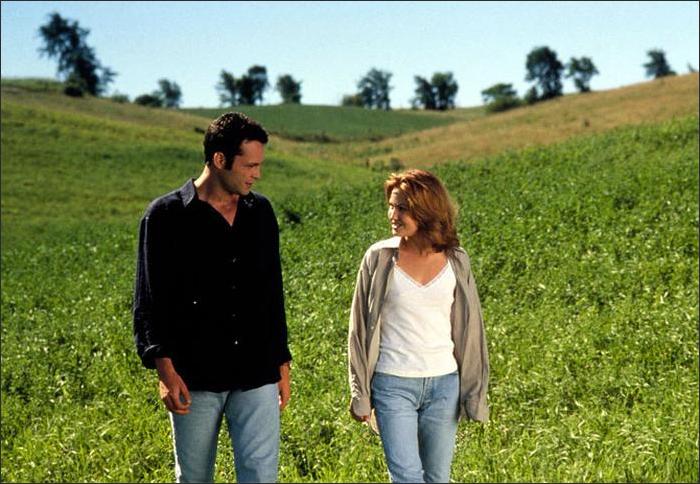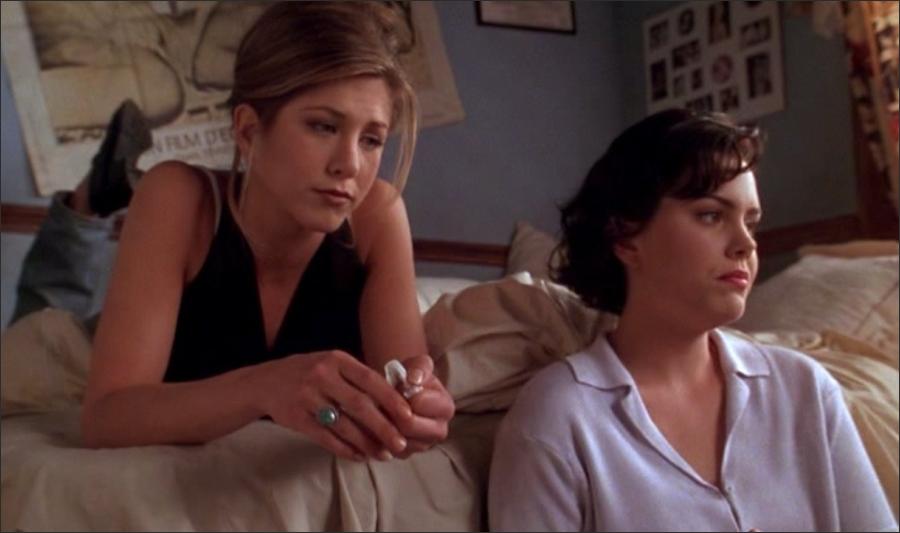Taglines: All the world’s a stage…
The Truman Show movie storyline. Peter Weir directed this comedy-drama, a commentary on all-pervasive media manipulation. Scripted by Andrew M. Niccol (Gattaca), the film plays like a combination of the British TV series The Prisoner and Paul Bartel’s The Secret Cinema. Truman Burbank (Jim Carrey) is unaware that his entire life is a hugely popular 24-hour-a-day TV series.
In this real-time documentary, every moment of Truman’s existence is captured by concealed cameras and telecast to a giant global audience. His friends and family are actors who smile pleasantly at Truman’s familiar catchphrase greeting, “In case I don’t see you later, good afternoon, good evening, and good night!”
Employed at an insurance company, Truman is married to merry Meryl (Laura Linney), and they live in the cheerful community of Seahaven, an island “paradise” where the weather is always mild and no unpleasantness intrudes. This is the basic situation of the series, which has grown over the years into a billion-dollar franchise for the TV network. As an unwanted pregnancy,
Truman was adopted by the network and raised in the zoolike environment of a TV soundstage. Thus, the TV audience became hooked when Truman was very young. Now, at age 30, he still doesn’t know he’s a prisoner on an immense domed city-size soundstage, simulating Seahaven. Both the illusion and the ratings will collapse if Truman ever leaves Seahaven.
In addition to elaborate events staged to make sure he stays put, Truman is given constant reminders of how wonderful Seahaven is compared to dangers in other parts of the world. However, his growing suspicions make him curious enough to try to leave, and the show’s director and master manipulator Christof (Ed Harris) must constantly devise ways to thwart Truman’s escape attempts.
To enter the harbor, Truman must overcome his fear of water, intentionally instilled in him when his father “died” in a boating accident and was written out of the script. Exteriors were filmed in the Victorian-styled upscale community of Seaside, Florida. In addition to the Burkhard Dallwitz score, original music by Philip Glass and classical excerpts are also featured.
The Truman Show is a 1998 American satirical science fiction film[4] directed by Peter Weir, produced by Scott Rudin, Andrew Niccol, Edward S. Feldman, and Adam Schroeder, and written by Niccol. The film stars Jim Carrey as Truman Burbank, adopted and raised by a corporation inside a simulated television show revolving around his life, until he discovers it and decides to escape; additional roles are provided by Laura Linney, Noah Emmerich, Natascha McElhone, Holland Taylor, Ed Harris, and Brian Delate.
The Truman Show was originally a spec script by Niccol, inspired by an episode of The Twilight Zone called “Special Service”.[5] Unlike the finished product, it was more of a science-fiction thriller[citation needed], with the story set in New York City. Scott Rudin purchased the script, and set up production at Paramount Pictures. Brian De Palma was to direct before Weir signed as director, making the film for $60 million—$20 million less than the original estimate. Niccol rewrote the script while the crew was waiting for Carrey to sign. The majority of filming took place at Seaside, Florida, a master-planned community located in the Florida Panhandle.
The film was a financial success, debuting to critical acclaim, and earned numerous nominations at the 71st Academy Awards, 56th Golden Globe Awards, 52nd British Academy Film Awards and The Saturn Awards. The Truman Show has been analyzed as a thesis on Christianity, metaphilosophy, simulated reality, existentialism and reality television.
The Truman Show (1998)
Directed by: Peter Weir
Starring: Jim Carrey, Laura Linney, Noah Emmerich, Holland Taylor, Natascha McElhone, Ed Harris, Brian Delate, Peter Krause, Heidi Schanz, Judy Clayton, Fritz Dominique
Screenplay by: Andrew Niccol
Production Design by: Dennis Gassner
Cinematography by: Peter Biziou
Film Editing by: William M. Anderson, Lee Smith
Costume Design by: Marilyn Matthews
Set Decoration by: Nancy Haigh, J Sanchez
Art Direction by: Richard L. Johnson
Music by: Burkhard Dallwitz
MPAA Rating: PG for thematic elements and mild language.
Distributed by: Paramount Pictures
Release Date: June 5, 1998
Views: 246
